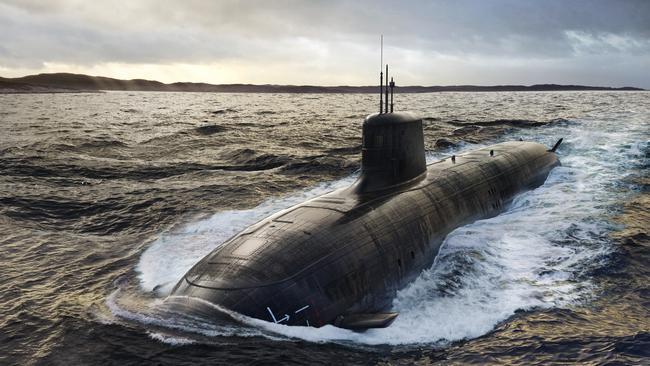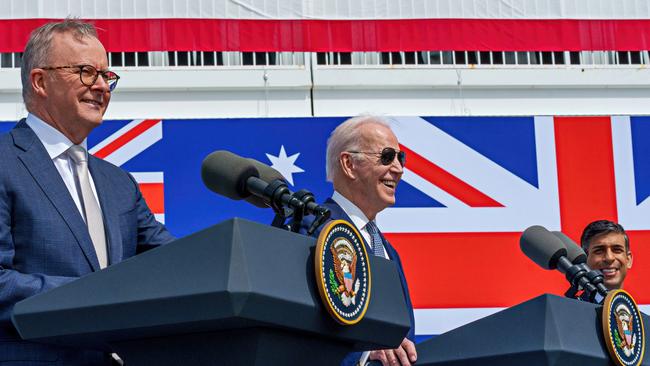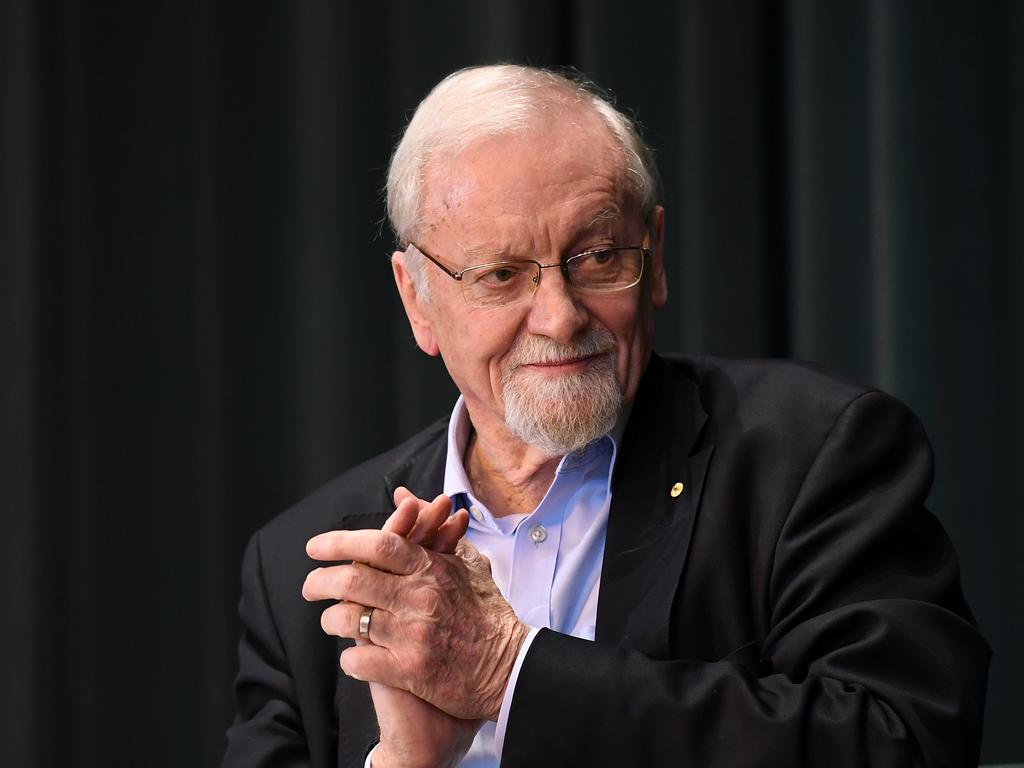AUKUS originals to embrace threesome of South Korea, New Zealand and Canada – that’s the pillar talk
Australia, the US and Britain will open the door to AUKUS co-operation with South Korea, New Zealand and Canada in a potential expansion of the pact’s so-called ‘Pillar II’ partnership.

You can now listen to The Australian's articles. Give us your feedback.
Australia, the US and Britain will open the door to AUKUS co-operation with South Korea, New Zealand and Canada in a potential expansion of the pact’s so-called “Pillar II” technology-sharing partnership.
Anthony Albanese, Joe Biden and British Prime Minister Keir Starmer will announce on Wednesday AEST that the core AUKUS members are considering co-operating with the potential new partners on advanced capability projects.
The move, in a leaders’ statement marking the pact’s three-year anniversary, follows an announcement in April that Japan was being considered as a potential AUKUS Pillar II partner, recognising its strengths as an advanced manufacturing nation.
Seoul, Wellington and Ottawa have all expressed interest in joining the defence agreement’s wider technology-sharing ecosystem, which is focused on developing autonomous vehicles including uncrewed submarines, together with quantum technologies, hypersonic missiles, and cyber and electronic warfare capabilities.
The nuclear submarine partnership is not expected to expand beyond its original three members, but the addition of friendly, hi-tech nations such as South Korea and Japan to Pillar II is seen as a way to turbocharge the development of vital weapons systems to counter China’s military rise.
White House national security adviser Jake Sullivan said on Tuesday that the AUKUS pact was already strengthening the security of the US and its allies.
“Through deep integration of our innovation communities, AUKUS partners are steadily developing and deploying advanced capabilities for our warfighters,” he said. “These efforts will continue in the years to come as we collaborate and invest in this historic partnership.”
Mr Sullivan said the countries had made “significant strides” in supporting Australia’s $368bn plan to acquire nuclear-powered submarines.
“Australian sailors are now enrolled in US and UK nuclear power training schools, Australian personnel are embedded in US shipyards, and each of our countries have made significant investments to strengthen our respective defence industrial bases, creating thousands of highly skilled jobs,” he said.
Mr Sullivan also highlighted legal changes to align the nations’ export control regimes, which have created what is effectively a military free-trade zone between the countries.

The Prime Minister will discuss AUKUS’s progress on Saturday with Joe Biden, Indian Prime Minister Narendra Modi, and outgoing Japanese Prime Minister Fumio Kishida, at a Quad leaders’ meeting in the US President’s home state of Delaware.
Canadian Defence Minister Bill Blair said last week his country was in talks with AUKUS members on joining the agreement’s Pillar II partnership
“There have been important discussions about processes and platforms on a project-specific basis on where other nations, including Japan and ourselves, might participate,” Mr Blair said in an interview in Tokyo.
“I would respectfully wait until they’ve come to their determination, but I’m very optimistic.”
New Zealand Prime Minister Christopher Luxon confirmed his country’s interest in joining Pillar II during a visit to Australia last month, while South Korea’s Defence Minister Shin Won-sik flagged Seoul’s interest during a trip to Australia in May for bilateral talks in Melbourne with Defence Minister Richard Marles and Foreign Minister Penny Wong.
Mr Shin said the country could “contribute to the peace and stability” of the region under Pillar II, as Mr Marles lauded South Korea’s “deeply impressive technology”.
The potential expansion of AUKUS Pillar II comes amid fears a future Trump administration could overturn the core nuclear submarine agreement, and that slow production in the US might prevent it from providing a promised three Virginia-class boats to Australia from the early 2030s.
There are also concerns that Britain may be unable to deliver on its commitment to develop a new SSN AUKUS boat for its use and Australia’s, following years of under-investment and delays in the country’s submarine sector.
Mr Marles hailed a newly signed AUKUS treaty tabled in parliament last month as “an important step forward” for the program, which he said was “not much more than a thought bubble” under the former Morrison government.
But the fine print of the treaty documents revealed Australia would shoulder the lion’s share of the risks of the AUKUS pact yet had been given no guarantees it would ultimately receive the promised nuclear boats.
Meanwhile, there is growing criticism of the submarine deal at home, especially from former senior Labor figures.
Former foreign minister Gareth Evans slammed the pact in The Australian on Tuesday as one of the worst decisions in Australia’s history.
He backed previous attacks by former prime minister Paul Keating and former foreign minister Bob Carr, saying the nation was ceding sovereignty to the US while saddling itself with exorbitant costs for dubious benefit.
But key architects of the nation’s defence policy over the past 40 years have attacked the pact’s Labor critics, blasting their claims that Australia would not have fully sovereign control over its nuclear submarines.
Defence Strategic Review author Peter Dean said the critics were effectively accusing Mr Albanese and his fellow AUKUS leaders of an “elaborate conspiracy” to delude the public on three continents.
Former Labor defence minister and opposition leader Kim Beazley told The Australian: “We are no more compromised on sovereignty than we were in the 1980s when we had joint facilities like Pine Gap.”






To join the conversation, please log in. Don't have an account? Register
Join the conversation, you are commenting as Logout